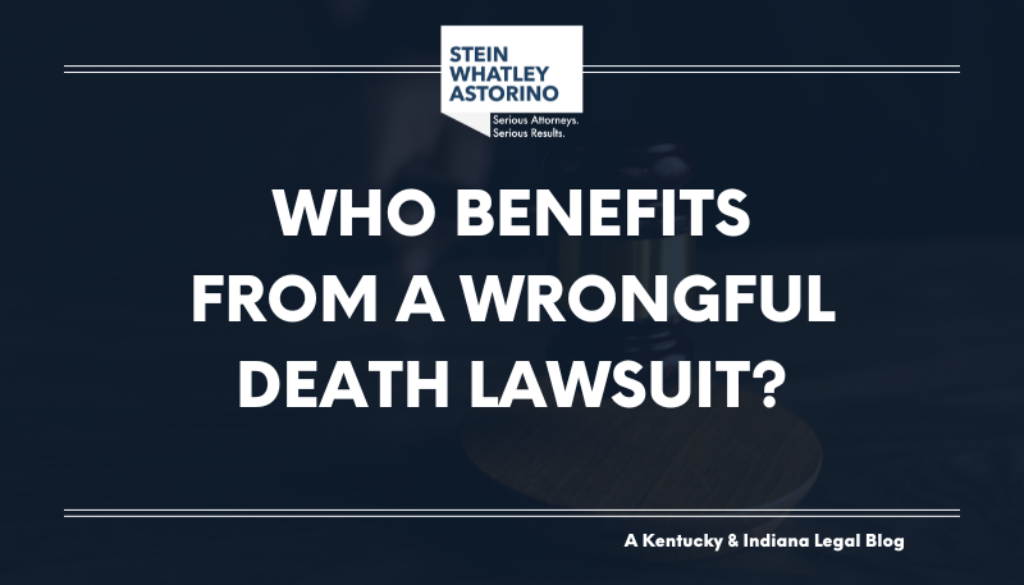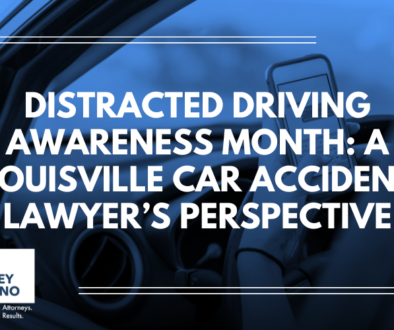Who Benefits from a Wrongful Death Lawsuit?
A wrongful death lawsuit is a legal action filed when a person dies due to the negligence, recklessness, or intentional harm caused by another party. Fatal accident lawsuits are distinct from criminal charges a bad actor might face. They serve to provide financial compensation to the deceased’s family members or estate.
This article explores who benefits from a wrongful death lawsuit in Kentucky and Indiana. It focuses on the immediate family members and the estate of the deceased. Additionally, it discusses the broader social and legal implications of such claims.
The Purpose of Wrongful Death Lawsuits
Wrongful death lawsuits are intended to compensate the survivors for the emotional and financial losses they suffer resulting from the death of a loved one. In Kentucky, as in other states, wrongful death claims can arise from a variety of circumstances. This includes car accidents, medical malpractice, workplace accidents, defective products, and criminal acts.
The primary aim of wrongful death lawsuits is to hold the responsible party accountable. It also provides financial support to the deceased’s family. However, these cases also serve a deterrent purpose. Society reinforces the importance of adhering to safety standards and regulations by imposing financial penalties on those whose negligence or recklessness leads to a person’s death. This not only benefits the individual family members but also helps to promote safer environments in industries like healthcare, transportation, and manufacturing.
Who Can File a Wrongful Death Lawsuit in Kentucky?
Kentucky’s wrongful death statute (KRS 411.130) governs the legal framework for such lawsuits in the state. In Kentucky, the personal representative of the deceased’s estate is the one authorized to file a wrongful death lawsuit. The personal representative is usually named in the deceased’s will. However, if the deceased died intestate (without a will), the court will appoint an administrator to represent the estate.
It is important to note that while the personal representative files the lawsuit, the compensation recovered from the claim is distributed to certain beneficiaries as prescribed by Kentucky law. These beneficiaries typically include the deceased’s surviving spouse, children, and parents. However, if none of these individuals are alive, the estate may receive the compensation. This can then be distributed to other relatives according to Kentucky’s laws of intestate succession.
Beneficiaries of a Wrongful Death Lawsuit in Kentucky
Under Kentucky law, the distribution of damages from a wrongful death lawsuit is determined by the relationship between the deceased and the surviving family members. The law outlines a specific order of beneficiaries, with the following individuals or groups benefiting from the lawsuit:
Surviving Spouse and Children
If a spouse and children survive the deceased, they are typically the primary beneficiaries of a wrongful death lawsuit. The distribution of damages depends on whether there is a spouse, children, or both. If both exist, damages are split between the spouse and children, with the spouse typically receiving one-half of the compensation and the children receiving the other half. If there is no spouse but surviving children, the children are the sole beneficiaries.
Surviving Spouse
If the deceased has a surviving spouse but no children, the spouse is entitled to the full amount of the damages awarded from the wrongful death lawsuit. The law aims to ensure that the surviving spouse receives financial support, particularly if they are financially dependent on the deceased.
Surviving Children
If the deceased was not married at the time of death but had surviving children, the children are the sole beneficiaries of the damages. This includes both biological and adopted children, but stepchildren or other dependents not legally adopted are typically not entitled to compensation under Kentucky law.
Parents of the Deceased
If the deceased had no surviving spouse or children, the deceased’s parents may receive damages. This situation is more common in cases where the deceased was a young adult or an unmarried individual without children. Kentucky law acknowledges the significant emotional and financial toll on parents who lose a child due to wrongful death and are entitled to compensation when no other closer relatives survive.
Deceased’s Estate
If the deceased has no surviving spouse, children, or parents, the compensation from the wrongful death lawsuit goes to the deceased’s estate. The estate will then distribute the funds according to the deceased’s will or, if no will exists, through Kentucky’s intestate succession laws. This could result in distant relatives, such as siblings, aunts, uncles, or cousins, benefiting from the lawsuit.
Types of Compensation in a Wrongful Death Lawsuit in Kentucky
The compensation awarded in wrongful death cases in Kentucky is intended to cover a range of damages. These damages are classified into two main categories: economic and non-economic damages. However, punitive damages may also be available in cases where the conduct of the person or entity that caused the death was outrageous or intentional.
Statute of Limitations
Kentucky law sets a time limit for filing wrongful death lawsuits. The statute of limitations for these claims is typically one year from the date of the deceased’s death. However, this time frame may vary slightly depending on the circumstances, such as when the personal representative is appointed. Failing to file the lawsuit within this time limit can result in the survivors losing their right to compensation. Because of the statute of limitations, families must act promptly in pursuing a wrongful death claim.
In Kentucky, a wrongful death lawsuit provides financial compensation to those who suffer the loss of a loved one due to someone else’s negligence or wrongdoing. The primary beneficiaries of such lawsuits are the deceased’s immediate family members, including the spouse, children, and parents. If no immediate family members are present, then the estate of the deceased may benefit.
Who Benefits from a Wrongful Death Lawsuit in Indiana?
Indiana wrongful death lawsuits are to seek compensation for the survivors of the deceased and hold the responsible party accountable for their actions. These lawsuits provide a way for grieving families and dependents to recover financial losses and receive a sense of justice. The laws governing wrongful death cases in Indiana are specific. Beneficiaries are limited based on their relationship to the deceased, along with other factors.
Immediate Family Members (Spouses and Children)
In Indiana, the primary beneficiaries of a wrongful death lawsuit are typically the surviving spouse and children of the deceased. When a person dies in a fatal accident, the loss suffered by the spouse and children can be emotionally and financially profound. Indiana law recognizes this tragedy and grants them the right to seek compensation for several types of damages.
Spouses: A surviving spouse often relies on the deceased for emotional, financial, and physical support. Losing a partner can lead to significant financial hardship, especially if the deceased was the primary breadwinner. A wrongful death lawsuit allows the spouse to seek compensation for loss of income, companionship, and household services the deceased provided. The emotional trauma of losing a partner also qualifies for non-economic damages, such as loss of consortium, which refers to the loss of the deceased’s companionship, love, and affection.
Children: The children of the deceased, whether minors or adults, can also benefit from a wrongful death lawsuit. For minor children, the death of a parent can mean the loss of financial support, guidance, and education. Indiana wrongful death law allows children to recover damages for the loss of parental care, love, and companionship. Adult children may still be entitled to some benefits if they are financially dependent on the deceased.
Parents of the Deceased
In certain circumstances, parents of the deceased may be entitled to benefits from a wrongful death lawsuit. This generally occurs when the deceased was a minor who is unmarried and without children.
For example, if a child dies due to someone else’s negligence, the parents may file a wrongful death claim seeking compensation for the loss of their child that includes:
- the loss of the child’s services.
- the loss of the child’s love and companionship.
- the costs associated with health care and hospitalization necessitated by the wrongful act or omission that caused the child’s death.
- the child’s funeral and burial.
- the reasonable expense of psychiatric and psychological counseling incurred by a surviving parent or minor sibling of the child that is required because of the death of the child.
In the case of an unmarried adult without children, Indiana law allows the parents to file a wrongful death lawsuit if they are financially dependent on the deceased. This scenario is less common but still possible in situations where the adult child is supporting older parents. The compensation in such cases can include loss of financial support, medical expenses, and emotional suffering due to the death of their child.
Adult Dependent Children or Other Heirs
In cases where the deceased does not have a surviving spouse, minor children, or parents, the law may allow for other dependents or heirs to benefit from the wrongful death lawsuit. Adult children financially dependent on the deceased can sometimes be entitled to compensation. Similarly, other close relatives or dependents, such as siblings, may be able to recover damages if they can prove financial dependence on the deceased.
For example, if the deceased was the sole caregiver for a disabled sibling or another family member who relied on them for financial support, the dependent may have a valid claim for damages. In such cases, the dependent must demonstrate the nature and extent of their reliance on the deceased to be entitled to compensation.
Compensation Categories and Limits in Indiana
Indiana’s wrongful death laws provide several categories of compensation that survivors and beneficiaries may recover. These categories include economic and non-economic damages. Indiana does not allow punitive damages in wrongful death actions.
Indiana law imposes limits on certain types of damages, particularly in cases involving the death of an adult without dependents or a surviving spouse. For example, in cases where the deceased is an adult who was unmarried and had no dependents, the damages are capped at $300,000 for the loss of the adult person’s love and companionship. You also cannot recover damages for a person’s grief.
A Path to Justice and Compensation
In Indiana, the beneficiaries of a wrongful death lawsuit are primarily those closest to the deceased—spouses, children, and parents. These individuals can recover compensation for the financial and emotional losses they suffer because of the wrongful death.
The financial compensation recovered through a wrongful death lawsuit can never fully compensate for the loss of a loved one. However, it can provide much-needed relief to the survivors and hold the responsible party accountable for their actions.
If you lost a loved one due to a fatal accident and believe that a wrongful death may have occurred, call Stein Whatley Astorino, PLLC. Our best Louisville wrongful death lawyers will investigate and gather critical time-sensitive evidence if we believe that a wrongful death has occurred.
Call 502.553.4750 to speak with an experienced attorney now. You can also request a top Louisville wrongful death attorney call you. The initial consultation is free and confidential.
Serious Attorneys. Serious Results.
Real Client Reviews
Highly Recommend
“I would highly recommend these attorneys. Rob is the best. He helped me in a case. We won the case and got paid what I was owed. If you need attorneys these are the people that will fight for you and the only lawyers I will trust.”
-Jacob Yeager
Google 5- Star Review
Fair and Honest
“Been using him for years. His whole team is great! They are fair, honest and really will go to work for you in a big way. Can’t go wrong.”
-Carey Hulsey
Google 5- Star Review




